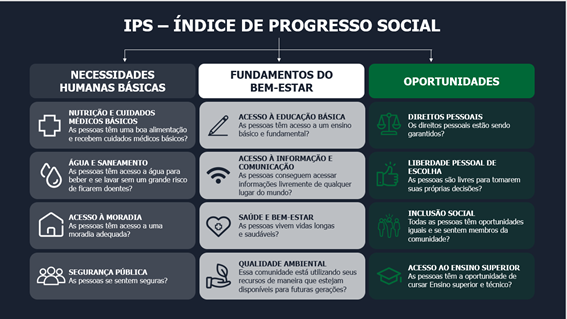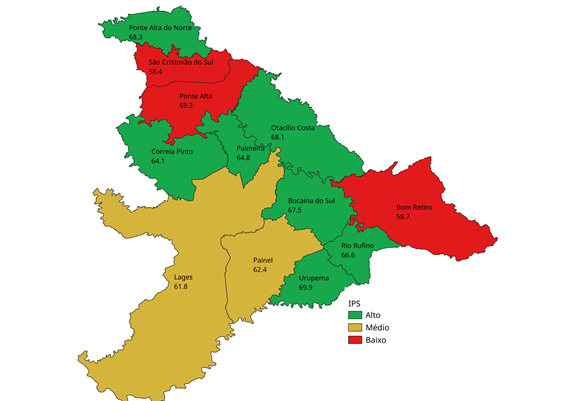Press Release
04/04/2022
Desenvolvimento local e Projetos Sociais
Mountain Region of Santa Catarina gains Social Progress Index with municipalities’ results available online
Santa Catarina, April 4, 2022 – An index that measures the social progress of municipalities based on an internationally recognized methodology. A website where this data is available to local communities and governments, enabling interaction and participative public management in the municipalities. All this was implemented last week with the launch of the Social Progress Index (SPI) for 12 municipalities in the Mountain Region of Santa Catarina, which includes Lages, Correia Pinto, Otacílio Costa, as well as nine other municipalities: Painel, Urupema, Rio Rufino, Palmeira, Ponte Alta do Norte, Bocaina do Sul, Ponte Alta, São Cristóvão do Sul and Bom Retiro.
The work is the result of a partnership between Klabin and Fundación Avina, an organization present in 20 countries with the mission of promoting large-scale changes for sustainable development across Latin America. The initiative was launched on March 31, in an online event with the participation of mayors and municipal secretaries of the region.
“The launch of this important index, which is aligned with our Sustainability Policy, helps us to conduct diagnoses and provide tools to support the planned and structured development of the regions where we operate and to prepare them to achieve the Sustainable Development Goals, the so-called 2030 Agenda,” said Francisco Razzolini, director of Industrial Technology, Innovation, Sustainability and Projects at Klabin.
What is the SPI – The SPI is an index that has been used around the world to measure and compare social progress and guide the allocation of public and private investments. The tool has helped cities, countries and regions to measure their progress towards the Sustainable Development Goals (SDG), which were agreed upon by all member states of the United Nations (UN).
Developed by Social Progress Imperative, an NGO based in Washington D.C., in partnership with the Harvard Business School and the Massachusetts Institute of Technology (MIT), the SPI has the differential of measuring only social and environmental results that directly impact people’s lives. It considers three dimensions: Basic Human Needs, Foundations of Well-Being and Opportunities. Each dimension is divided into four components, as shown in the chart below.

Figure 1: The Social Progress Index. Source: Fundación Avina
Results – For the SPI of municipalities in the Mountain Region of Santa Catarina, official data from public sources were used combined with a perception survey conducted of 1,300 people in 12 municipalities in the region, in December 2020. The results show that the average SPI of the region municipalities was 64.20 in 2021, which means that, on average, the region is halfway towards achieving the Sustainable Development Goals measured by the index.
The results for all municipalities are shown in Figure 2.

Figure 2 – SPI of municipalities in Klabin’s area of influence in Santa Catarina (2021). Source: Fundación Avina
In addition to providing an overall comparison of the municipalities, the tool allows for analyzing specific areas. A three-color semaphore indicates whether the location is positioned above (green), below (red) or near the region’s average (yellow). All results are available on the Território em Desenvolvimento portal at território.app.br.
One of the highlights of the study was observing that municipal GDP does not always accompany the level of social progress, since the growth of municipalities brings new challenges as well. With the region’s highest GDP and population, the municipality of Lages registered a good performance in Basic Human Needs (75.2 points) and in the indicators of access to water and sanitation and to housing. However, Lages still faces significant challenges in terms of access to opportunities and improvement in female representation on the City Council, which was only 25%. Meanwhile, other cities in the region have doubled the level of female representation.
Another positive factor was public safety in the region compared to other regions of Brazil and the world, with the highlights Lages (87.8) and Otacílio Costa (85.9). As usual, some small cities stood out for their low crime and police incident rates.
The difference between the SPI and other metrics that measure social development, such as the Human Development Index (HDI), is that it focuses on observing social and environmental indicators rather than economic variables. “Social progress is not necessarily linked to economic growth. Sound management of resources and community engagement can be decisive for social progress,” explained Marcelo Sette-Mosaner, manager at Fundación Avina who is responsible for the SPI in Latin America. “Few municipalities in Brazil and Latin America have access to such up-to-date and relevant data on their situation and that of their region. And this data is invaluable for supporting management by governments, communities and the private sector,” he added.
The indicators also will be used to assess Klabin’s social programs in the region. “We have social programs to assist these municipalities in the areas of planning, education and family farming, and the SPI will help us to measure the value each of these initiatives delivers to the communities,” said Uilson Paiva, Community Relations and Social Responsibility manager at Klabin.
#IPS #ESG #SantaCatarina
 pt
pt
 en
en
 es
es